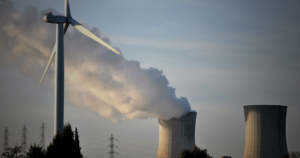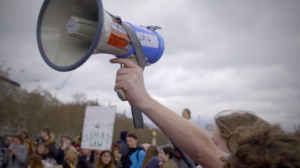For those of us who might consider ourselves battle-hardened but weary ‘veterans’ of the Climate COP process over the last quarter of a century, the cycle of triumphant hope over realistic expectation and invariable disappointment is all too familiar. The dismal failure of ‘Hopenhagen’ (COP15) in 2009 during the contrived ‘Climategate’ scandal, followed by the cautious welcome for the ambitious aspirations of the Paris Agreement (COP21) in 2015, is just a snapshot of the wild rollercoaster we’ve ridden for most of our careers. The ‘good COP, bad COP’ narrative vividly embodies that hoary cliché of noir-detective interrogation techniques that exploit the disorientating dynamic of shrill threat and sympathetic trust to ‘crack’ the subject’s resistance. Will we get a ‘bad COP’ of corporate greenwash, political-posturing and self-congratulatory back-slapping for the delivery of insufficient targets that still send us all to Hell in a handcart? Or might we dare to entertain the idea of a ‘good COP’ the twenty-sixth time around? Maybe the public will just be bamboozled by the full spectrum media spin that will claim both as ‘real’ outcomes depending on your perspective?
Already the stage is set for the usual quixotic mix of lofty idealism, showboating commitments and behind the scenes gerrymandering. The UK, Glasgow and Scotland’s leadership positioning is bumping up against the wilful cognitive dissonance of a new Cumbrian coal mine, the economic justification of which is akin to Darth Vader describing the construction of a new Death Star as an ‘amazing job creation opportunity’ (or ‘absolutely ridiculous’ according to Professor Sir Bob Watson). Yes Darth. But it destroys planets. And merely consolidates a ‘do as we say, not as we do’ colonialist and patrician message to other emerging economies around the world.
Beyond these ‘Death Star Economics’ there is a more sinister movement of ‘predatory delay’, the deliberate slowing of the transition towards a genuinely zero carbon future by those who continue to profit from the status quo, whilst the devastating costs of those activities continue to be borne by us all, and for whom the pace of the change required is genuinely commercially extremely uncomfortable, and in many cases untenable.
But there is also always hope. ‘The Just Transition’ is the mantra. How do we redeploy the vast expertise and experience of Scotland’s fossil-fuel offshore engineering skills into renewable energy? The UK is a key global player in offshore wind, seven of the ten biggest turbine farms in the world are in our wind-whipped waters, and the Prime Minister himself has trumpeted the enormous potential for domestic electricity that can come from a resource the International Energy Agency has described as having the ability to provide all global electricity needs. Eighteen times over. At Greenpeace we’ve been saying this for almost two decades.
“It’s a story we as the UK should be rightly proud of, engineering a second clean and green industrial revolution after our first rather less auspicious coal-powered version.”
When I lived in Orkney in the mid-nineties experimental wind turbines were built of concrete, were punishingly noisy (if you could hear them over the gales) and a parochial, remote outlier in the energy mix literally laughed at by the local oil industry. Now they are a genuinely international success story. Scottish Power has led the way, divesting all it’s fossil fuel and hydropower assets to focus exclusively on renewables. The next generation turbines being installed are as high as London’s Shard, multi-megawatt in output, and leaner, sleeker floating turbines will be next. And it’s a story we as the UK should be rightly proud of, engineering a second clean and green industrial revolution after our first rather less auspicious coal-powered version.
However maintaining the linear corporate industrial ‘pipe’ model of electricity is only part of the solution. Leaving power generation and distribution primarily in the hands of large corporations and the rest of us as passive ‘consumers’ misses an enormous opportunity for the vibrant, cohesive, decentralised, distributed and resilient model of community renewables.
It is hard to overstate the exciting possibility of an electricity and energy system powered also by smaller onshore wind turbines, millions of solar-roofed households and locally generated heat, from anaerobic digestion to ‘poo power’. An electric vehicle fleet operating collectively as a ‘national battery’ to store excess renewable energy. A system that is more significantly about power to, by and for the people as active producers, customers and crucially owners in a mutual web of connection.
But that is not going to happen by accident. That will need to be demanded, and regulated for. We need to level the playing field to pay small electricity producers the same prices for their watts as the big boys and girls. We need to remove the barriers to entry. We need to make community renewables generate the same local pride, investment and sense of ownership that was felt in the former coal-mining communities of the past.
This is real ‘people power’. It is also I believe wildy populist in the positive sense. We also have the not immodest target of somehow making the UK’s entire housing stock ‘net zero’, which involves retrofitting tens of millions of households. When surveyed in regard to national infrastructure spending that’s what people really want. Not new roads or heaven forfend HS2. But cosy homes.
The good news is people are engaging more. The ‘Marmite’ effect of Extinction Rebellion and Great Thunberg has brought our lack of genuine climate preparedness as a group of nations onto the agenda. ‘Tell the truth. And act like that truth is real’ is still the single most persuasive climate campaign slogan I’ve heard in over two decades of activism. And the UK’s first National Citizen’s Assembly on Climate Change, an authentically representative cross-section of demography, drew up core principles along similar lines, the top 4 of which were: informing and educating everyone (i.e. ‘truth-telling’), fairness, government leadership and nature-based solutions.
“It would be amazing in a city famed for its history of collective social activism to see us begin to realise the proper potential for a people-led mass transformation of UK energy and our homes.”
So what do I hope for from Glasgow? Well it would be amazing in a city famed for its history of collective social activism to see us begin to realise the proper potential for a people-led mass transformation of UK energy and our homes. To begin the reimagination of farming, land use and rewilding to change our diets. To relocalise our cities into convivial ’15 minute’ walkable, cyclable hubs in a post-pandemic world beyond the traditional commute. To ensure those with the highest carbon footprints are actively disincentivised through equitable mechanisms like the Frequent Flyer Levy, whilst improving the quality of life and comfort for the poorest and most vulnerable with the lowest.
For me there is no fear in the prospect of this new world that is already being born in small pockets and enclaves across the UK, only the imaginative possibility of a much better tomorrow for us all. When the bunfight is over come November it would be fantastic to hear muttered in Glaswegian pubs: ‘Aye, now that was a fair COP’.
Ed Gillespie is the author of ‘Only Planet’ and a poetry collection ‘Songs of Love in Lockdown’. He co-presents two podcasts ‘The Great Humbling’ and ‘Jon Richardson and the Futurenauts – How to survive the Future’. He is a Director of Greenpeace UK, a Facilitator at The Forward Institute and involved in numerous ethical start-up businesses as an advisor, investor or mentor.





